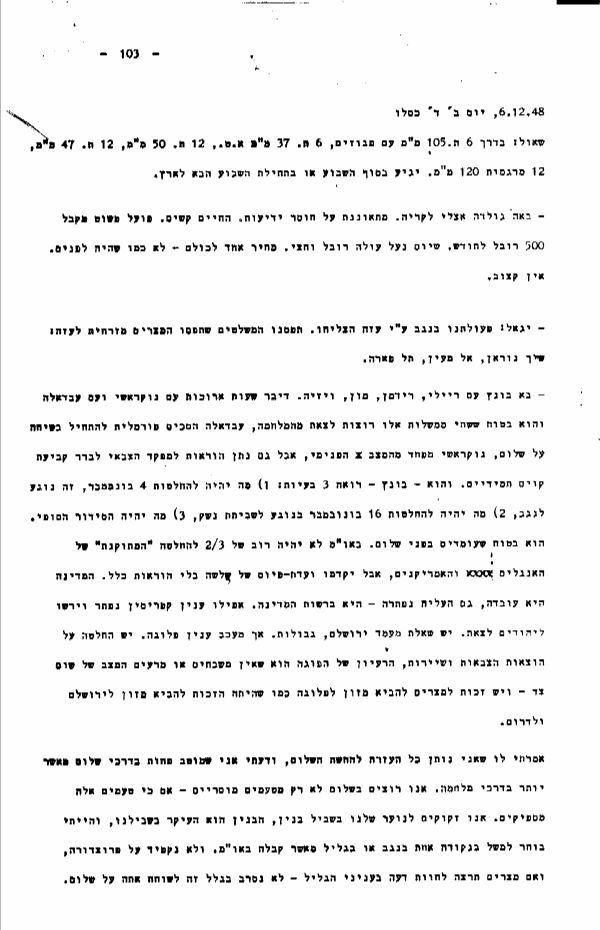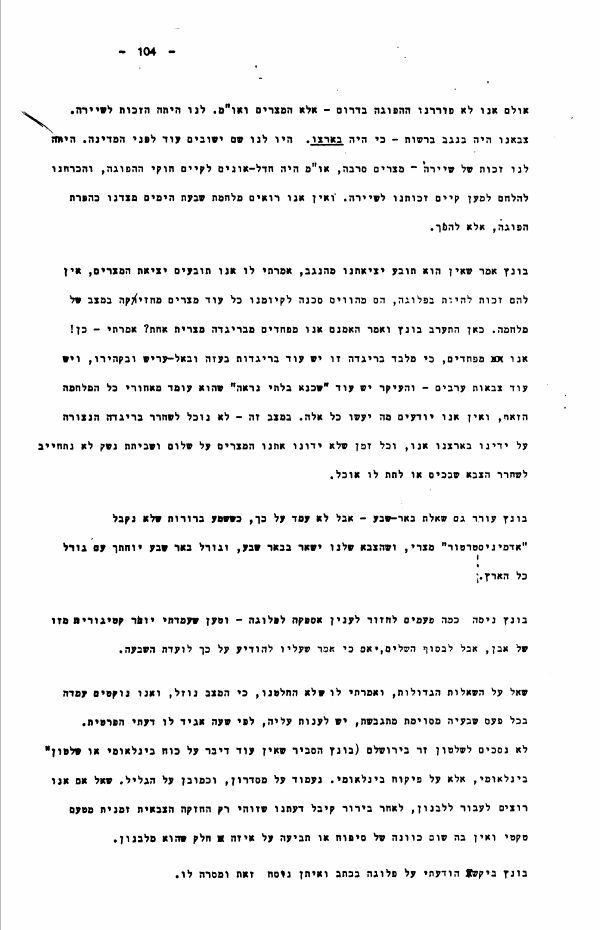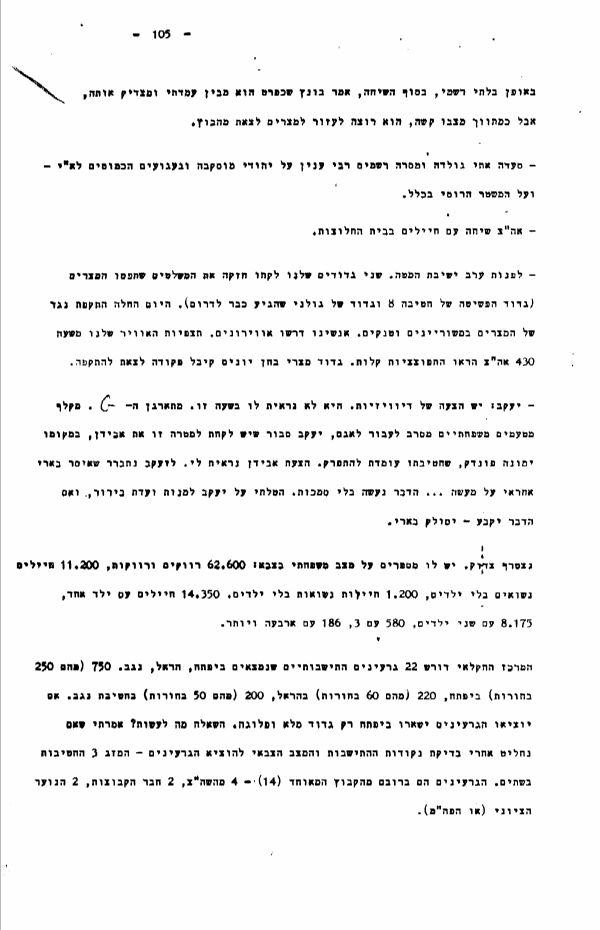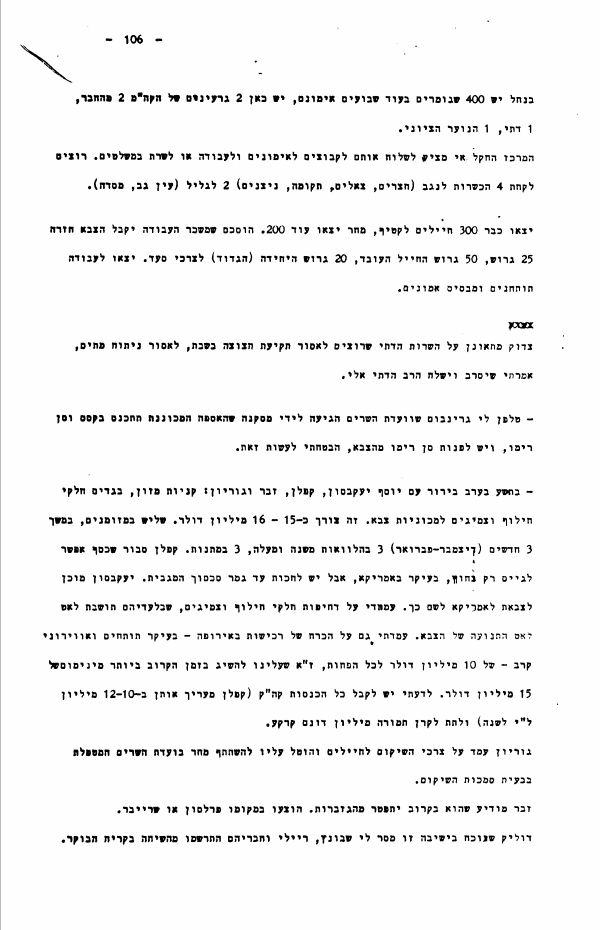Monday, December 6, 1948
Shaul [Avigur]: en route are 6 105 mm C. [cannons] with shells, 6 37 mm A.T. [anti-tank] C., 12 50 mm [anti-tank] C., 12 47 mm [anti-tank] C., 12 120 mm mortars, will arrive in the country over the weekend or at the starting next week.
- Golda [Meir] came to see me at the Kirya [government compound]. She's complaining about a lack of information [from Israel].
Life [in Russia] is hard. A simple laborer receives 500 rubles per month. A shoestring costs 1½ rubles. There's one price for everyone - unlike before. There's no allocation.
- Yigael [Yadin]: Our action in the Negev near Gaza was successful. We seized the strongholds that the Egyptians had seized [earlier] east of Gaza: Sheikh Nuran, Al-Ma'in, Tel Farah.
- Bunche came with Riley, [John] Reedman [sp.], Maun [sp.], Vigier [from UNTSO]. He'd spoken for many hours with [Egyptian Prime Minister] Nuqrashi [Pasha] and [King] Abdallah [of Transjordan], and he's certain that both these governments want to be done with the war. Abdallah formally agreed to start peace talks, Nuqrashi is afraid of the domestic situation, but also gave instructions to the military commander to examine the issue of establishing permanent lines [borders]. He - Bunche - sees three problems: 1) what will happen with the [Security Council] resolution of November 4, regarding the Negev; 2) what will happen with the resolution of November 16, regarding an armistice; 3) what will be the final arrangement. He's certain that peace lies ahead.
The UN won't have a 2/3 majority for the amended resolution of the English and the Americans, but they will establish a conciliation commission of three without general instructions. The state is a fact, [and] ''Aliya [Jewish immigration] has also been resolved - it's in the hands of the state. Even the matter of [the camps in] Cyprus was resolved and the Jews will be allowed to leave. There's the question[s] of Jerusalem's status, [and the] borders. But the matter of Faluja is overshadowing. There's a decision regarding withdrawal of the forces and the convoys.
The idea with a truce is that neither side's situation improves or worsens - and Egypt has the right to bring food to Faluja, just as [we] had a right to bring food to Jerusalem and the south.
I told him that I fully support expediting peace, and that in my view it's better to [achieve] less by way of peace then more by way of war. We want peace not only for moral reasons - although these reasons are sufficient. We need our young people for building, building is the essence for us, and I would choose one settlement in the Negev or the Galilee, for example, over admission to the UN. We won't insist on procedure, and if Egypt wants to express an opinion regarding the Galilee, we won't refuse to discuss peace with it because of that, although it was not us - but rather the Egyptians and the UN - who violated the truce in the south. We had a right to a convoy. Our force had permission to be in the Negev - because it was in its own country. We had settlements there even before the state. We had the right to a convoy - Egypt refused, the UN was powerless to uphold the terms of the truce, and we were forced to fight in order to actualize our right to a convoy. And we do not view the seven-day war [Operation Yoav] as a violation of the truce on our part, but rather the opposite.
Bunche said that he is not demanding that we leave the Negev.
I told him: We demand that the Egyptians leave; they have no right to be in Faluja; they constitute a threat as long as Egypt is maintaining a state of war.
At this Bunche became annoyed and said: Are we [you] really afraid of one Egyptian brigade?
I said - yes! We're afraid, because aside from this brigade there are also mobile brigades in El-''Arish and Cairo, and there are also Arab armies - and most of all there's also an "invisible presence [?]" who's behind this entire war [Britain], and we don't know what all of them will do. Given this situation, we cannot release a brigade besieged by us in our own country. And as long as the Egyptians won't discuss peace and an armistice with us, we won't commit to releasing the force in the "pocket" or giving it food.
Bunche also raised the question of Beersheva - but didn't insist on it when he heard explicitly that we would not accept an Egyptian "administrator," that our forces would remain in Beersheva, and that the fate of Beersheva would be determined along with the fate of the entire country.
Bunche tried a few times to return to the issue of supplying provisions to Faluja - and claimed that my position is more categorical than that of [Abba] Eban, but eventually he relented, although he said that he had to notify the committee of seven [Security Council subcommittee] of this.
He asked about the major questions, and I told him that we haven't decided, because the situation is fluid, and we adopt a position each time a particular problem emerges and needs to be addressed. For now I'll give him my personal opinion. We won't agree to foreign rule in Jerusalem (Bunche explained that there's no more talk of an international force or international "rule" but rather of international oversight). We'll insist on a corridor [to Jerusalem], and of course on the Galilee. He asked whether we want to extend to Lebanon. After clarification he accepted our view that this is only a temporary military possession for tactical reasons, with no intent to annex or demand any part whatsoever of Lebanon.
Bunche asked for a statement in writing from me on Faluja, and [Walter] Eytan drafted this and gave it to him.
At the end of our conversation Bunche stated unofficially that as a private individual he understands my position and considers it justified, but as a mediator he's in a difficult position, and he wants to help Egypt get out of the quagmire.
- Golda [Meir] dined with me and presented very interesting impressions of Moscow's Jews and secret longings for Eretz Israel - and of the Russian regime generally.
In the afternoon a conversation with soldiers at Beit HaHalutzot [the Women Pioneers' House on King George Street in Tel Aviv].
- In the late afternoon [General] Staff meeting. Two of our battalions took back the strongholds that the Egyptians had captured (the 8th Brigade's raid battalion and a Golani battalion that had already arrived in the south). Today an Egyptian counter-attack was launched with armored vehicles and tanks. Our men requested airplanes. Our aerial patrols from 4:30 p.m. showed light explosions.
An Egyptian battalion in Khan Yunis received an order to launch an attack.
- Ya'akov [Dori]: There's a proposal for divisions. It doesn't seem right to him - at this time. The G [General Staff] is organizing. For family reasons, [Mordechai] Makleff refuses to transfer to the Operations Department. Ya'akov thinks that [Shimon] Avidan should be taken for this purpose, [and] he would be replaced with [Yitzhak] Pundak, whose brigade [Oded] is about to dissolve. The proposal regarding Avidan seems right to me.
Ya'akov learned that Isser Be'eri was responsible for the incident of [blank, should be: ''Ali Qasim]. It was done without authorization. I tasked Ya'akov with appointing an investigation committee, and if this is the finding - Be'eri will be ousted.
[Moshe] Zadok joined. He has figures on family status in the army: 62,600 unmarried men and women, 11,200 married soldiers without children, 1,200 married women soldiers without children, 14,350 soldiers with one child, 8,175 with two children, 580 with three, 186 with four or more [total 98,291].
The Agricultural Center is requesting 22 settlement-oriented core groups [of Palmach members] who are currently in Yiftah, Harel, Negev [brigades]; 750 (250 of them women) are in Yiftah, 220 (60 of them women) in Harel, 200 (50 of them women) in the Negev Brigade. If the core groups are removed, there will remain only one full battalion and a company in Yiftah. The question is: what should be done? I said that if we decide to remove the core groups, after examining the settlements and the military situation, we'll merge the three brigades into two.
The core groups are mainly from HaKibbutz HaMeuchad (14) - 4 from HaShomer HaTza'ir [HaKibbutz HaArtzi], 2 Hever HaKvutzot, 2 HaNo'ar HaTzioni (or HaPo'el HaMizrachi).
In NAHAL [No'ar Halutzi Lohem - Pioneer Fighting Youth, a combined military service and agricultural settlement program] there are 400 who will finish their training in two weeks. There are 2 core groups of HaKibbutz HaMeuchad here, 2 of Hever, 1 religious, 1 HaNo'ar HaTzioni.
The Agricultural Center proposes sending them to kibbutzim for training and work, or to serve in strongholds. They want to take four trained groups to the Negev (to Hatzerim, Tze'elim, Tkuma, Nitzanim), 2 to the Galilee (to ''Ein Gev, Massada).
500 soldiers have already left for the fruit harvest, tomorrow another 200 will leave. It was agreed that out of the work wage [P£ 1.65], the army will receive 95 grush in return, the working soldier 50 grush, the unit (battalion) 20 grush for support purposes. Those leaving to do this work will be artillerymen and [soldiers] from a training base.
Zadok is complaining about the religious service wanting to prohibit horn blowing on Saturday, to prohibit autopsies. I told him to refuse, and to send the religious [should be: military] rabbi to see me.
- [Yitzhak] Gruenbaum telephoned me [to say] that the ministerial committee reached the conclusion that the Constituent Assembly will convene at Kessem [Cinema] and San Remo [Hotel] [in Herbert Samuel square in Tel Aviv], and the army needs to be cleared out of San Remo. I promised to do so.
- At 9 p.m. consultation with Yosef Yaakovson, [Eliezer] Kaplan, [Avraham] Zabar, and [Yosef] Gurion: purchases of food, clothes, spare parts, and tires for army vehicles. This requires about $15-16 million. A third in cash over the course of 3 months (December-February), 1/3 in loans for a year or more, 1/3 in gifts. Kaplan thinks that the money can only be raised abroad, mainly in America, but it's necessary to wait until the fundraising dispute is resolved. Yaakovson is prepared to go to America for this purpose. I emphasized the urgency of spare parts and tires, without which the army's mobility will gradually cease. I also emphasized the need for procurements in Europe - especially cannons and fighter planes - at $10 million at least; that is, we must obtain $15 million at a minimum as soon as possible. I think [we] should receive all the KKL income (Kaplan estimates it at P£ 10-12 million per year) and in exchange give the fund [KKL] a million dunams of land.
Gurion emphasized the rehabilitation needs of soldiers, and he was tasked with participating tomorrow in the ministerial committee that is handling the issue of authority for rehabilitation.
Zabar announces that he will soon resign from the treasury. [Eliezer] Perlson [Peri] or Schreiber [Zvi Shariv] were proposed to replace him.
Dolik [David Horowitz], who attended this meeting, told me that Bunche, Riley, and their associates were impressed by the conversation at the Kirya this morning.












